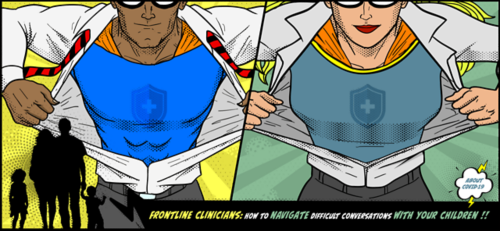St. Jude Family of Websites
Explore our cutting edge research, world-class patient care, career opportunities and more.
St. Jude Children's Research Hospital Home

- Fundraising
St. Jude Family of Websites
Explore our cutting edge research, world-class patient care, career opportunities and more.
St. Jude Children's Research Hospital Home

- Fundraising
Frontline clinicians: How to navigate difficult conversations with your children about COVID-19

What do clinician-parents say to their children about working during a pandemic? Here’s how to navigate difficult conversations with children.
As clinicians on the frontlines, you face many stressors as you continue to provide optimal care to patients. At home, you may also be presented with questions and concerns from your children related to your job and the COVID-19 outbreak.
Parents are expected to have all the answers and to know how to explain things. However, many parents feel understandably uncertain about their answers during a global pandemic.
As parents, you know your child best. Some children want to know everything about COVID-19 and your work, while other children want to change the subject. I worked with Samantha Toohey of child life to come up with helpful tips for navigating difficult conversations with children.
Why do you have to go to the hospital when other parents work from home?
Validate your child’s concerns and help them understand your role as a clinician.
You can say:
“I know this must be difficult and confusing for you. I have to go to work because my job is to help people in the hospital. There are a lot of people who are sick from COVID-19 right now. I need to help them get better. Schools, malls, offices and lots of other places people work are closed to help keep people healthy. But the hospital is still open because that is where we take care of sick people. That’s why I keep going to work when you see other parents staying home or doing their work from home.”
What happens if you get COVID-19 at work?
Many older children and adolescents know that people who work in the health care system may be at higher risk of contracting COVID-19. Children can have a range of reactions when their parents leave for work; therefore, it’s essential to be honest and open with them to relieve their anxiety. Children can also have bright imaginations, which can lead to unnecessary anxiety in times of stress. Try to find a healthy balance between answering questions openly and providing too much information, which can feel overwhelming. You can gauge how much your child understands and wants to know by asking questions yourself.
You can say:
“What do you think will happen? If I get COVID-19, I will do everything I can to keep our family safe and keep the germs from spreading. While I’m at work, I wear special masks, gowns and gloves to keep me safe. If I do catch the virus, I will have to quarantine myself. This means I will need to be alone in a room in our house or somewhere else to make sure the germs don’t spread. If this happens, you can still talk to me on Facetime or through the door, and you can send me pictures, letters and notes. I might not feel well. I may get a fever or a cough and feel weak. We won’t be able to hug, kiss, or spend time physically together if I get COVID-19, until the virus leaves my body. But I still love you and will find ways to show you. I just want to keep you healthy and not spread the germs.”
It can also be helpful to ask about their general feelings as well as how they feel about changes in daily life.
You can say:
“What do you know about coronavirus?“How do you feel when you hear about coronavirus?”
Is your work dangerous? Are you scared to go there?
Be honest that your work can be challenging, but reassure children that health care facilities and workers do everything they can to protect themselves and patients. Remember to validate your child’s questions and concerns. It’s helpful to remind them of the positive aspects of your job as well.
You can say:
“Working in a hospital can be difficult because we are around germs and sick people, but it is an important job that I love doing. I work there because I want to help people, and I know how to protect myself from the germs. Everyone who is working at the hospital takes steps to keep everyone safe. We wash our hands frequently and wear masks and other special equipment to protect ourselves from germs.”
Why do you have to be at work for so long? Why do you have to work on the weekends?
- Your child may be noticing changes in their routine and community. They may be having difficulties with your extended absences and unpredictable schedules. While there’s much uncertainty in today’s world, maintaining a sense of consistency and routine is highly beneficial for children.
- While you may not know your exact work schedule, a calendar or list that is left in a shared space may help your child cope with the stress of not having you at home. It’s important to help your children understand your hours are subject to change.
- Maintain open communication as much as possible. Sometimes children feel reassured by speaking with you or knowing in advance that their routine is changing (e.g., you won’t be home on time).
- Despite long hours and unpredictable schedules, keep a routine and provide stability.
Why can’t I hug mom or dad right when they get home from work?
Your child may not understand why there are changes in everyday family routines, such as being able to greet you as they normally would when you come home from work. Help them understand the reasons for these changes. Make sure you maintain ways to stay connected, but help your child understand you need to keep everyone safe with these extra precautions in the home.
You can say:
“I want to protect everyone I can and keep them healthy. When I come home from work, I want to make sure I am not bringing any germs back from the hospital where I was taking care of patients. I may have to take off my hospital clothes in a different part of the house so the germs don’t travel. I may even want to shower before I hug you and say hello. This is all to keep you safe.”
Here are alternative ways to show affection or love without hugging:
- Facetime your child or family before heading home to remind them of these new safety rules.
- Write notes and letters, draw pictures, or send videos of yourself checking in and saying hello during your shift, if time permits.
- Create special, scheduled play time or engage in other preferred activities.
- Highlight positive moments from the day. For example, recognize an accomplishment or talk about a happy moment.
Why is mom/dad sad or worried?
Children can pick up on the emotions of parents and caregivers. While anxiety and other unpleasant emotions are understandable and appropriate during a pandemic, be aware of how you are managing your stress. When talking to your child about your work or COVID-19, do your best to maintain a calm demeaner. Also, try to be mindful of when your child might overhear conversations or pick up on behaviors that show your anxiety. Offer reassurance and remind them about the things they can do to help prevent illness, such as washing hands and social distancing. Help them understand that it’s OK to have a hard day at work and that sometimes your job is stressful.
You can say:
“Sometimes, I feel sad after work because it’s hard to see lots of people who are sick. Today was a hard day at work. But it’s OK to sometimes have hard days and feel sad or worried. It’s also normal to feel sad or nervous about the virus. Even though today was hard at work, I’m happy I can be home now with you and spend time together.”
Navigating Media and Managing Anxiety
- Children and adolescents can be exposed to inaccurate information about COVID-19 on social media and the internet.
- Talk about COVID-19 when the opportunity arises. Encourage open and honest discussions. This can reduce anxiety, confusion and misconceptions. Clarify any misconceptions they may have.
- Talk about what your child already knows and check their understanding. Provide accurate information to help reassure your child. Misinformation can lead to increased anxiety. Give them a sense of control and emphasize the importance of using recommended strategies to prevent the spread of COVID-19, such as hand washing and social distancing.
- Exposure to repetitive news of stressful or traumatic events can harm a child’s emotional well-being. Limit the amount of news coverage your child watches; make sure your child receives credible information; and monitor social media use.
- Sometimes teenagers feel invincible and think risks do not apply to them. You may have noticed your teen not taking the coronavirus seriously. They may think everyone is just blowing it out of proportion. Keep in mind that teens may be hearing misinformation from others, especially from friends and social media.
Be reassured that there’s no one right way to talk with your child about difficult topics. Keep these conversations open, and give yourself grace for supporting your child, your family and yourself through this difficult time.
If you need additional help, be sure and reach out to family, friends or mental health providers.
St. Jude Child Life Specialist Samantha Toohey contributed to this blog post.






